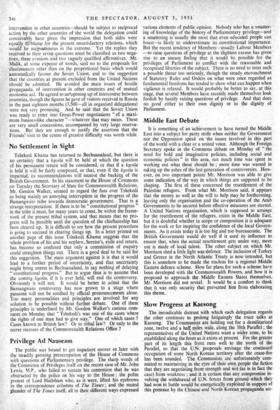Privilege Ad Nauseam
The public was bound to .get impatient sooner or later with the steadily growing preoccupation of the House of Commons with questions of Parliamentary privilege. The sharp words of the Committee of Privileges itself on the recent case of Mr. John Lewis, M.P., who failed to sustain. his contention that he was obstructed by the police on his way to the House ; the polite protest of Lord Hailsham who, as it were, lifted his eyebrows in the correspondence columns of The Times ; and the muted jhunder of The Times itself, all in their different ways expressed various elements of public opinion. Nobody who has a smatter- ing of knowledge of the history of Parliamentary privilege—and a smattering is usually the most that even educated people can boast—is likely to underestimate its constitutional importance. But the recent tendency of Members—usually Labour Members —to raise questions of privilege at the slightest excuse has given rise to an uneasy feeling that it- would be possible for the privileges of Parliament to conflict with the reasonable and recognised liberties of the subject. There is no need to treat such a possible threat too seriously, thdugh the steady encroachment of Statutory Rules and Orders on what were once regarded as 'fundamental freedoms has tended to show what can happen when vigilance is relaxed. It would probably be better to say, at this stage, that several Members have recently made themselves look foolish by hastily raising questions of privilege. And that does no good either to their own dignity or to the dignity of Parliament.






























 Previous page
Previous page